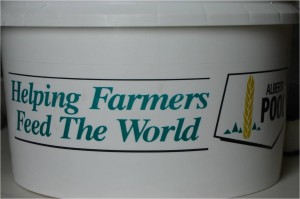 (October 31, 2011) Today marks a mile stone of sorts. The earth’s population has reached seven billion people. For farmers a little sober reflection might be in order.
(October 31, 2011) Today marks a mile stone of sorts. The earth’s population has reached seven billion people. For farmers a little sober reflection might be in order.
In the agriculture sector we have the usual commercial interests coming forward with magic bullets to sell to farmers so they can “feed the world.” These usually involve energy intensive technology and always involve the farmer spending more money for inputs. Sometimes these result in greater yields and sometimes, as with continuous cropping, fuller utilization of existing land. Almost always this results in lower prices at the farm gate.
A hungry world and cash-strapped farmers has driven some western Canadian farmers nearly mad over the past 40 years and they have lashed out at their own institutions blaming the Wheat Board or the Pools for low prices. The Alberta Wheat Pool did not help with its slogan “Helping farmers feed the world” when our global market niche has always been marketing high quality wheats and barley to the upper middle class of the world.
Why is there such a disconnection between wide spread malnutrition and low farm gate prices? A recent UN Food and Agriculture Report on China highlights part of the problem. As China has grown richer it would seem logical their food imports would increase. After all, their population is growing and their agricultural production is stagnant at best. According to this UN report the answer lies in income distribution. China once had a policy of feeding its entire population. Now that income distribution is much more unequal, many people simply cannot afford expensive foreign imports, including grain. And of course, the few who are rich simply cannot eat enough to offset all the newly impoverished. In short, poor people don’t buy much food and really poor people starve.
Another factor driving global hunger is the export programs of both the European Union and the United States. Their programs have landed subsidized grains into Africa and parts of Asia for decades. This has bankrupted local farmers and triggered the greatest human migration in history into the teaming cities of the developing and third world. This is really a form of economic warfare disguised as “food aid.”
Canada has relatively clean hands in this. Our Canadian Wheat Board has concentrated on developing and serving a global niche market of rich consumers in 70 nations around the world. Instead of creating poverty in other nations, we are building wealth here at home in an honourable way. Which is more than the other grain exporting nations can claim.
If Harper and Ritz have their way and kill our Wheat Board, the multinational corporations that thrive on this unjust system will force Canadian farmers to provide more raw materials for this war on the developing nation’s farmers.

